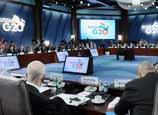
JERUSALEM, July 21 (Xinhua) -- U.S. Secretary of State John Kerry on Friday announced that Israeli and Palestinian mediators would soon meet in Washington for peace talks. Although the two parts agreed to go back to the negotiating table, to reach a finally agreement is still a long way to go, local analysts say.
The announcement was a victory for Kerry's dedication to peace process. Since he took office in February he has visited the region six times for face to face meeting with Israeli, Palestinian and Arab leaders.
But since the details of the deal weren't revealed, there is no way of knowing if Kerry managed to find a way to solve the main issue that had held up negotiations since September 2010, when an Israeli freeze on settlement construction ended.
Dr. Jonathan Spyer, of the Interdisciplinary-Center in Herzliya, told Xinhua that Kerry instead of solving these issues he appears to simply push them forward in time.
MAIN ISSUE UNSOLVED
Prof. Galia Golan of the Interdisciplinary-Center in Herzliya, said that she thinks the minimum that the both sides have agreed to is Kerry will make his statement on how the Americans see the talks, meaning the 1967 lines as the basis for the border talks with the idea of swaps, but neither of the two sides are forced to make a commitment.
"It still isn't clear what steps Israel is willing to take, what the framework is going to be and what the agenda is going to be. In other words, the very same issues that hold back them before, the 1967 lines, the prisoner release and the settlement freeze haven't been fully agreed upon yet," Golan said.
Golan added that she suspects there is going to be more bickering and more arguing when the negotiators from the two sides meet in Washington.
So far the only details that can be attributed to a source with a name are the remarks by Israeli Minister of Intelligence, International Relations and Strategic Affairs, Yuval Steinitz, who was quoted as saying that, as part of the deal, Israel would release a number of Palestinian prisoners who had been in Israeli prison before the Oslo agreement in 1993.
The exact number of prisoners are unknown as well as the timing for their release but some of them were accused of being involved in attacks targeting Israelis.
Steinitz added that Israel hadn't agreed to any of Palestinian President Mahmoud Abbas' pre-conditions, which includes using the ceasefire lines that existed prior to the 1967 War as the borders of a future Palestinian state and a freeze on construction in settlements in the West Bank and east Jerusalem.
DOMESTIC OPPOSITION
Golan said that for Kerry the important thing is to get the talks restarted and for Netanyahu that's okay as long as he keeps saying that he hasn't agreed to any preconditions.
"In other words, Netanyahu is going to tell his cabinet that there is no settlement freeze but let's not build in difficult places, and there will be prisoners released but the timing is going to be a little bit fuzzy. Netanyahu will do what is necessary without admitting to them that he agreed to any preconditions because that would cause trouble with his coalition partners," Golan added.
The most critical coalition partner is the head of the HaBayit HaYehudi party, Naftali Bennett, who has threatened to leave the government if Netanyahu agreed to the 1967 lines, which means Israel would abandon some settlements.
However, the possibility that his government would fall isn't the only thing that Netanyahu needs to worry about, since "one of the major problems that he faces is not the coalition but within his own party," according to Golan.
Netanyahu's Likud party has always been a right-wing party but over the last couple of years it has moved toward more to right and lost many of its more moderate politicians. Furthermore, his party has elected representatives such as Deputy Defense Minister Danny Danon, who has been quoted as saying that the current government would block any deal that would lead to the establishment of a Palestinian state.
















 Floodwater gushes from sluices of Gezhou Dam, China's Hubei
Floodwater gushes from sluices of Gezhou Dam, China's Hubei


![]()
